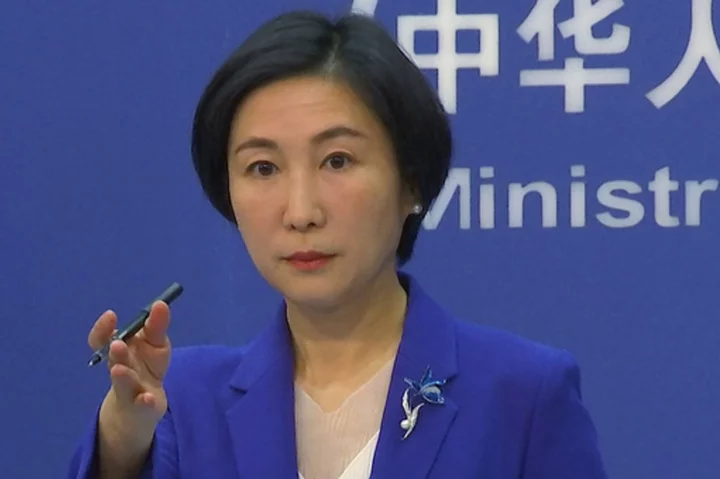BEIJING (AP) — Beijing responded Wednesday to complaints from the United States about a Chinese fighter jet’s dangerous interception of an American Air Force reconnaissance aircraft in international airspace over the South China Sea by demanding an end to such flights.
The incident adds to military, diplomatic and economic tensions between the sides over U.S. support for self-governing Taiwan, China's refusal to engage in dialogue between their armed forces and Beijing's flying of a suspected spy balloon over the U.S.
Foreign Ministry spokesperson Mao Ning told reporters at a daily briefing Wednesday that China would keep taking measures it deems necessary to safeguard its sovereignty.
"The U.S. should immediately stop these dangerous provocations," Mao said.
The U.S. Indo-Pacific Command called the Chinese plane's actions an “unnecessarily aggressive maneuver,” adding to complaints that China’s military has become significantly more aggressive over the past five years, intercepting U.S. aircraft and ships in the region.
China says it owns the South China Sea virtually in its entirety, a claim not recognized internationally and directly challenged by nations along its coast including the Philippines, Vietnam and Malaysia.
In a statement Tuesday, the U.S. military said the pilot of the Chinese J-16 fighter jet flew directly in front of the nose of the RC-135 conducting routine operations in international airspace last Friday.
Military-to-military contacts between the sides have all but evaporated in recent years amid a historic decline in governmental relations, even as trade and personal exchanges remain strong.
Further dampening prospects for a reduction in tensions, China said its defense chief will not meet with U.S. Defense Secretary Lloyd Austin when the two men attend a security conference in Singapore over the weekend.
Austin is scheduled to address the Shangri-La Dialogue on Saturday, while Chinese Defense Minister Gen. Li Shangfu will speak at the gathering on Sunday.
China has said the U.S. is entirely responsible for the breakdown in communications, but has not publicly given a reason.
With its People's Liberation Army as the world's largest standing military, which answers directly to the ruling Communist Party, China frequently challenges military aircraft from the U.S. and its allies in the South and East China Seas, and the Taiwan Strait connecting the two.
Such behavior led to a 2001 in-air collision between a Chinese fighter and U.S. Navy surveillance plane in which the Chinese plane was lost and pilot killed.
In Tuesday's statement, the Indo-Pacific Command said America will continue to “fly, sail, and operate — safely and responsibly — wherever international law allows,” and expects all other countries to do the same.









